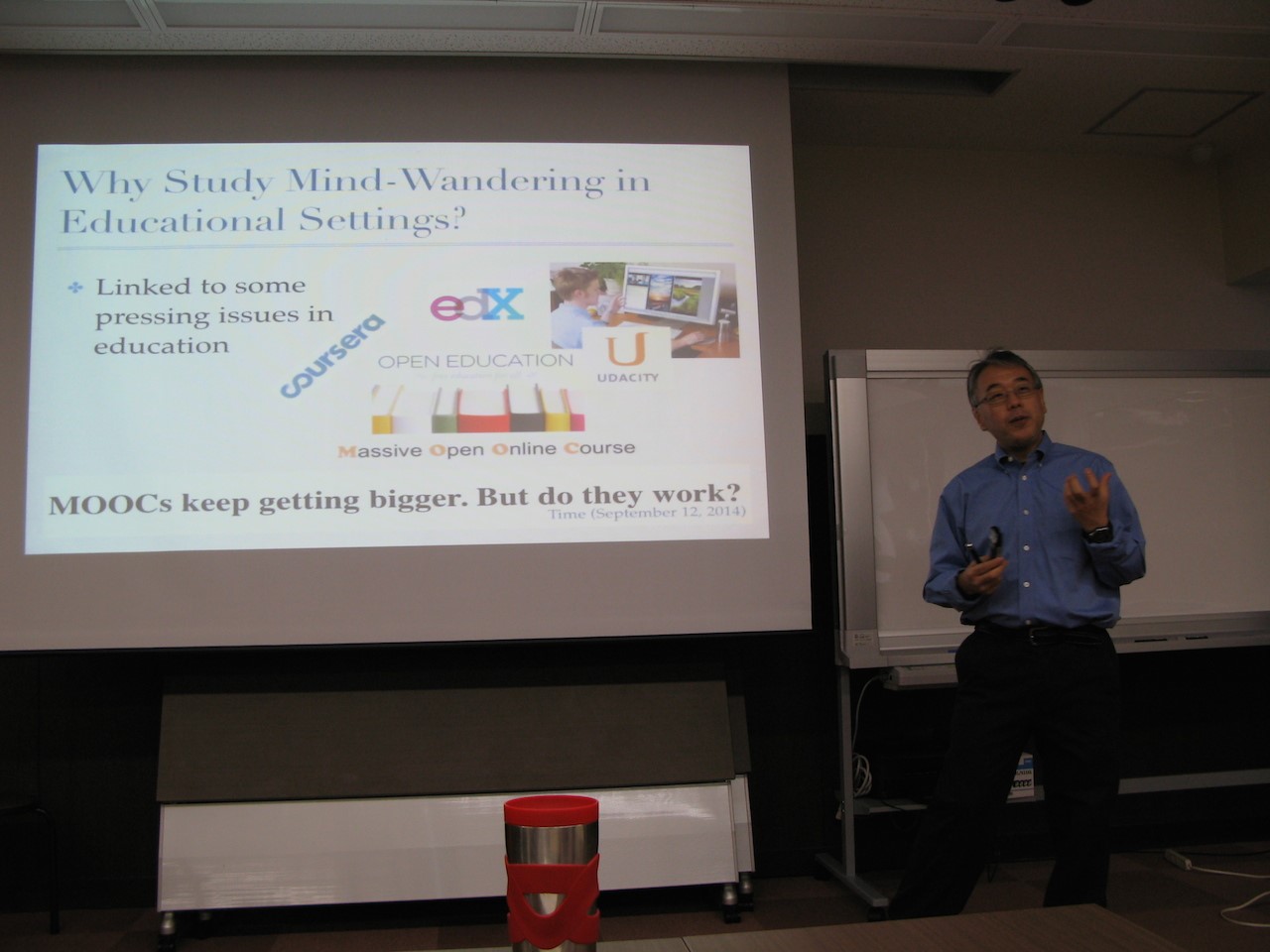The effects of mind-wandering on learning from lectures:
The role of note-taking, topic interest, and working memory capacity
日時:2014年11月27日(木) 13:30~15:00
場所:教育学部本館1F 第一会議室
教育学部本館1Fのアクセス
講演者:Professor Akira Miyake(University of Colorado at Boulder)
担当者:齊藤 智(京都大学大学院 教育学研究科 准教授)
ssaito[at]educ.kyoto-u.ac.jp([at]を@に変えてください)
講演概要
マインド・ワンダリング (mind-wandering)とは、今取り組んでいる課題以外のことに思考が逸れ、何か別のことを考えてしまうという心理学的現象を指す。こうした思考の逸脱現象が、学習活動やその他の課題遂行に対して大きな影響を持つことが知られている。今回は、ワーキングメモリ (working memory)と実行機能 (executive function) というマインド・ワンダリングと深く関わる研究分野において先端的研究を牽引している研究者を招聘し、講演会を開催する。どのような状況や個人の特性がマインド・ワンダリングの生起と関わっているのか、また、どのような介入が学習に対するマインド・ワンダリングの悪影響を緩和するのかについての最新の研究成果を紹介していただき、こうした報告をもとに、学習環境のデザインについて議論する機会とする。
In this talk, I plan to present the results of a brand-new study that our research team just finished conducting. This study is part of a collaborative research project with Dr. Michael J. Kane (University of North Carolina Greensboro). The primary goal of this project is to understand how mind-wandering and other distractions (e.g., checking emails, texting) affect the learning of science contents (especially statistics) from lectures. In particular, our team tries to understand what sort of situational and individual differences factors contribute to the occurrence of mind-wandering during lectures and what sort of cognitive or motivational interventions might be effective in reducing the negative impact of mind-wandering on learning. As a first step toward these goals, our team conducted a large-scale study (N = 200) that examined the impact of a common classroom activity, note-taking, on mind-wandering. Undergraduate students who had not taken any statistics course before were randomly assigned to the note-taking or no-note-taking condition and viewed a 50-min video lecture on introductory statistics during which their frequency of mind-wandering was assessed using online probes. Before the lecture, the participants completed a selective set of individual differences measures that may be preditive of the frequency of mind-wandering episodes during the lecture (e.g., prior interest in statistics, working memory capacity). The learning of the lecture content was assessed at both pretest and posttest with different types of questions. In this talk, I will present the results from this study that we have just started to analyze and discuss the theoretical and practical/educational implications of the results. I will also provide an overview of some currently ongoing studies (e.g., the effects of tweeting/texting on mind-wandering and learning) and the studies we plan to conduct in the next (Spring 2015) semester (lab-based intervention studies and a classroom observational study).
講演要旨:
報告書(PDF)

コロラド大学ボールダー校の三宅晶教授による講演。マインド・ワンダリング (mind-wandering)とは、今取り組んでいる課題以外のことに思考が逸れ、何か別のことを考えてしまうという心理学的現象を指す。こうした思考の逸脱現象が、学習活動やその他の課題遂行に対して大きな影響を持つことが知られている。今回の講演では、ワーキングメモリ (working memory)とマインド・ワンダリング、そしてそれらの学習活動への影響が、最新の研究プロジェクトの成果によって検討された。マインド・ワンダリングの生起に関わる個人の特性と学習環境のデザインについて、議論を行った。講演は英語で行われ、質疑応答のほとんども英語で行われたことから、デザイン学大学院における若手研究者の育成という観点からも有意義であった。
京都大学 デザイン学大学院連携プログラムKyoto University PAGE TOP